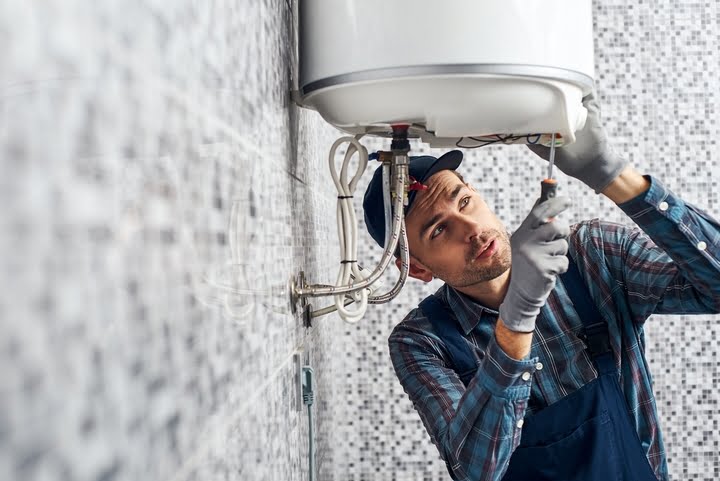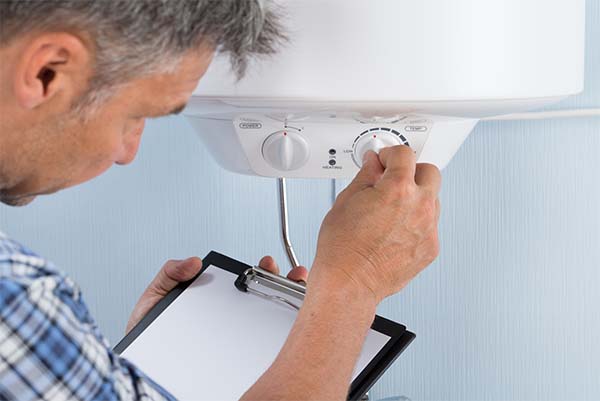Crucial Procedures for House Owners Managing Faulty Heating Units
Crucial Procedures for House Owners Managing Faulty Heating Units
Blog Article
Nearly everybody maintains their own unique perception when it comes to Maintaining & Draining a Water Heater.

Whether it lies in the basement or a different area, damaged water heaters can trigger stress. A basic device holds 80 gallons, so an over night leak will certainly lead to a flood. This results in significant residential property damage with soaked walls and also floorings. Having no hot water supply is likewise frustrating. If you are dealing with these problems, take note of the following:
Call the Plumber
After doing the first 2 security steps, you must call your plumber to come right away to deal with a burst water heater. There are usually indicators that your aging water heating system has debris buildup in the inside.
Do not wait on major flooding to call the plumber. Already, you will certainly have to invest even more to restore your home. Rather, as soon as you spot these indications, have a professional pertained to evaluate your hot water heater tank. Typically, water heaters have a lifespan of regarding 8 to 12 years. With normal evaluation as well as upkeep, you can lengthen its life.
Cut Off the Cold Water Supply
Cut off the containers tap water supply from the resource. This goes from your major water line right into the tank. When your tank is in good condition, the cold water stops filling out when the container is complete. However because it is leaking, the water will certainly continue to flow. Close the shutoff located on top of the heater. Turn this clockwise to close it off. If you can not find it or reach it, you should turn off that primary water line outside your residential property.
Shut Off Source Of Power
Prior to calling the plumber, shut down a gas water heater by transforming the temperature level dial. This is usually located on top of the thermostat. Switch off the circuit breaker if you have a version that runs on electric power. This will certainly stop electrocution, specifically if there is a leakage as water is a conductor. Generally, the heating element shuts down when the water hits a particular temperature. Yet with a broken storage tank, it might malfunction. Cutting it off guarantees you stay risk-free.
Clean Up Property
After calling the plumber, document damages by making note and images so you can assert your homeowner's insurance policy. From there, begin the prompt cleaning. Take out any important personal belongings to prevent further soaking. Remove any type of standing water to protect against mold and mildew and mold development. If you have a submersible water pump, use that to drain pipes the water. Otherwise, the traditional container method will also function. Attempt to mop out every little thing, including baseboards and also walls. If you have an electric follower and also dehumidifier, maintain them going to maintain air circulating. This will help discourage mold development.
Bear in mind, if you discover any type of issues with your water heating system, call the pros right away. You can not take this issue lightly due to the fact that a faulty thermostat can elevate water temperature to a precariously high degree, leading to unintentional burns.
After doing the initial 2 security actions, you must call your plumber to come right away to deal with a burst water heating unit. Rather, as soon as you spot these signs, have a specialist come to evaluate your water heating system container. Prior to calling the plumber, shut off a gas water heating unit by transforming the temperature dial. If you have a submersible water pump, use that to drain the water. Keep in mind, if you see any problems with your water heating system, call the pros right away.
Is My Water Heater Broken?
The Water Heater is Old
No appliance will last forever. This includes a home’s water heater. During its lifespan, residents are going to face a situation where a new water heater installation will be necessary. The biggest problem with this is that most people are not sure when their water heater expires. Not knowing this can lead to serious risks if the unit begins to act up due to old age.
Most makes and models of water heaters will last between eight and 10 years. While 10 years is the age when water heater replacement is highly recommended, the need to replace the unit may occur before this time or after. If the unit doesn’t show any symptoms of a problem, it is a good idea to replace it at the 10-year mark (from the manufacture date).
Some of the symptoms that indicate a new unit is needed include rusting, leaks, noises, and a failure to heat up the water. Also, note that not all units have a 10-year life expectancy. The main exception to this rule is that a gas unit will last for six to eight years.
Rusty Heater Inlet Valve or Water
While steel is the strongest material on earth, it does have a weakness – rust. If corrosion occurs on a steel surface, it will begin to spread and eat through the steel in certain areas. On water tanks and pipes that are made of steel, rust is a warning sign of an impending leak.
The issue for many is trying to figure out if the rust is coming from the water heater or the pipes that lead to the faucet. If rust is seen, it is a clear indication that water heater service from the professionals is needed.
If rusty water appears out of the faucets in the bathtub or sink, it likely means a rusty water heater. If there is rust near the water inlet or the pressure relief valve, rust has likely developed inside the tank. If tap water appears rusty, it may be an issue with the pipes.
Strange Sounds from the Water Heater
Are there strange sounds coming from the tank? As a water heater gets older, rumbling noises may develop and get louder and louder as the water in the tank heats up. In homes where large amounts of hot water are used, the issue is likely going to be even more obvious when more serious issues arise. If there is a strange or loud noise coming from the unit, it is probably because of sediment buildup. A good way to remedy this problem is by flushing the heater. If this does not work, then a new unit may need to be installed.
Leaks
As a water heater gets closer to the end of its useful life, there is a higher chance there will be water around the tank. If there is water, this usually means leaks are occurring. Based on where the unit is located in the home, a leak may result in serious property damage.
Leaks are usually caused by expansions in the metal tank. The expansions occur as time passes and as the inside body of the tank is exposed to multiple heating cycles per day. When a fracture forms, the gap will be slight enough to hold the water in; however, in more serious situations, this will not be the case. If the tank is idle, the water will not leak but when the metal expands during each heating system, small amounts of water will get through the gap.

We had been made aware of that write-up about What Do You Do When Your Water Heater Bursts? through an associate on another web property. If you please take the opportunity to distribute this post if you appreciated it. Thank you for going through it.
Request An Estimate Report this page